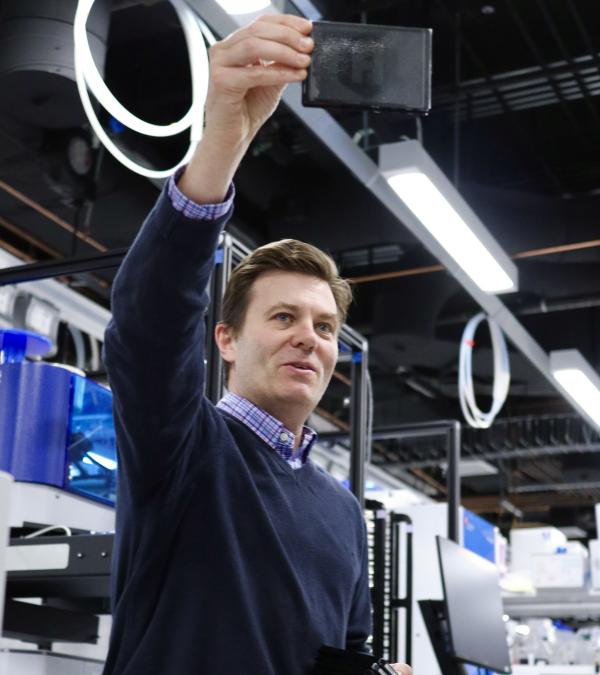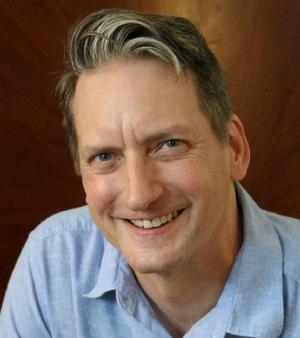NCATS Taps Matthew Hall as New Scientific Director
Translational Scientist Champions Team-based Approach, NIH-wide Partnerships
BY TERRY RUDD, NCATS

CREDIT: NCATS
During a tour of NCATS’ Rockville, Maryland, laboratories, Matt Hall shows a microplate that scientists use to rapidly test large numbers of potential drug treatments.
It’s a riddle even renowned Victorian-era physician and crime-fiction creator Sir Arthur Conan Doyle might struggle to solve: What do Sherlock Holmes, rugby, and translational science have in common?
The answer is elementary: They’re all passions of the new NCATS scientific director, Matthew Hall.
Hall’s love of rugby and his status as an avowed “Sherlockian” are a synergistic fit with his professional pursuits as a translational scientist. Just as rugby rewards collaborative hard work by a team of diversely talented individuals, translational science tackles perplexing research challenges by uniting individual creativity with team science, while demonstrating a Sherlockian knack for uncovering innovative solutions.
As NCATS’ scientific director, Hall will lead the Division of Preclinical Innovation (DPI). DPI conducts collaborative preclinical research projects for common and rare diseases, and it develops new methods and technologies that speed translational research. Hall succeeds Anton Simeonov, who guided DPI to an array of translational science achievements and partnerships.
“Matt brings an exceptional combination of NIH research experience and leadership skills to his new role,” said NCATS Director Joni Rutter. “His team-first mindset and broad scientific expertise will continue to speed the translational process of turning scientific discoveries into health interventions.”
Hall, who began his new role in January, is committed to strengthening the center’s role as a world-class translational science hub.
“I am excited to continue our culture of teamwork to bring new therapies to people, particularly in underserved areas like rare diseases,” Hall said. “I also look forward to building partnerships with other NIH institutes and centers, including NIH extramural partnerships. The NIH environment is one that lets us innovate scientifically, but also organizationally. There’s incredible opportunity to create integrated research environments from multiple ICs on the intramural side. I’d like to find the best way to tackle scientific challenges, and a big part of that is building working relationships across NIH. I think conversations can lead to innovation for patients.”
Hall earned his bachelor’s degree in chemistry, molecular pharmacology, and toxicology and his doctorate in chemistry from the University of Sydney (New South Wales, Australia). Before joining NCATS, Hall served as a research fellow and then became a staff scientist at NCI’s Laboratory of Cell Biology. While at NCI, Hall led collaborative research programs on the clinically challenging phenomenon of cancer multidrug resistance.
After joining NCATS in 2015 as a biology group leader in what became NCATS’ Early Translation Branch (ETB), he later served as ETB director. Hall’s recent achievements include two NIH Director’s Awards for his work on the Antiviral Program for Pandemics team and the Accelerating COVID-19 Therapeutic Interventions and Vaccines team. He also won an HHS Secretary’s Award for Meritorious Service for his work on the OpenData Portal, which offers real-time information about how individual SARS-CoV-2 variants may respond to known therapeutics.
Hall’s research covers a range of human pathologies and diseases, with a rare disease emphasis, and most of it has been in partnership with a chemistry group led by Samarjit Patnaik and a cheminformatics group led by Min Shen. Hall has published more than 190 peer-reviewed papers, including one on the collaborative discovery of a small-molecule class [YC-1] that selectively targets intrahepatic cholangiocarcinoma and hepatocellular carcinoma (PMID: 36914816). In response to COVID-19, Hall and his NCATS colleagues explored potential repurposed drug compounds to block TMPRSS2, an enzyme crucial to SARS-CoV-2’s invasion of cells (PMID: 35648838). He serves on the editorial board of Drugs of the Future, co-chairs the NCI Chemical Biology Consortium Steering Committee, and belongs to several scientific associations. In 2023, Hall’s alma mater conferred him as an Honorary Fellow of the University of Sydney for his many contributions to his field and to the university.
“My favorite scientific projects have all been deep collaborations,” said Hall. “The YC-1 [the molecule helpful in the fight against liver cancer mentioned above, PMID: 36914816] collaboration with Nabeel Bardeesy [Massachusetts General Hospital Cancer Center, Harvard Medical School, Boston] is a nice example. The compound was found through screening, but screening hits are only curiosities. It took several years of close partnership to discover the mechanism of YC-1, and that understanding is a start point for finding promising molecules with therapeutic potential. We’re working on several very rare diseases where we hope to develop molecules that can be useful for treating patients.”
Hall’s NIH colleagues welcomed the news of his new appointment. “I could not be more pleased about this outstanding appointment,” said Michael Gottesman, chief of NCI’s Laboratory of Cell Biology and Hall’s first NIH PI. “To say he was always a creative, independent, and extraordinarily effective scientist from the very beginning would be an understatement. He was a magnet for outstanding trainees, and he has continued at NCATS to recruit excellent scientists, to pursue important projects, and to catalyze networks of scientists working in teams to enhance public health.”
Amy Newman, NIDA’s scientific director and a long-time collaborator with Hall, said she welcomes him among the director-level ranks. “Matt is keenly attuned to the translational potential of science in the intramural program and has already created strong ties with a broad array of institutes,” she said, adding, “NCATS provides the link between basic research and medication development across diseases, and Matt is clearly ready to take the lead.”
What does Hall do in his extramural hours when he’s not in the stands at Old Glory DC’s pro rugby games or home reading Victorian detective works? “This is all very awkward—I’m a member of multiple Sherlock Holmes groups,” he admits. He also applies his research talents to Hall family genealogy and the written histories of Australia’s early European convicts and settlers.

Terry Rudd is a technical writer and editor at NCATS.
This page was last updated on Tuesday, December 3, 2024
